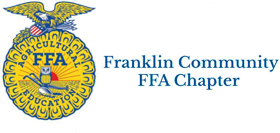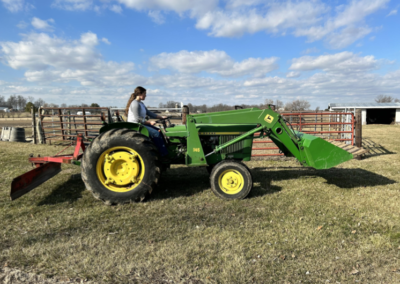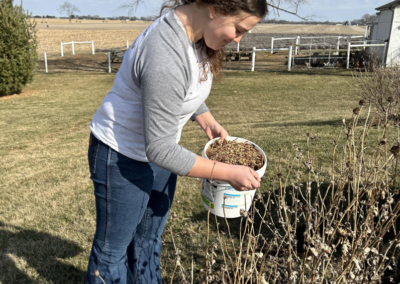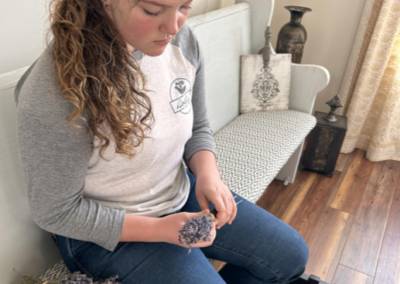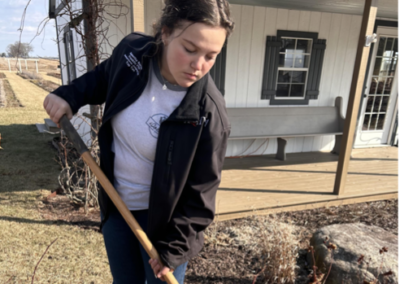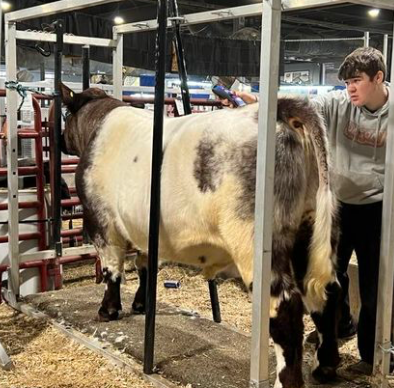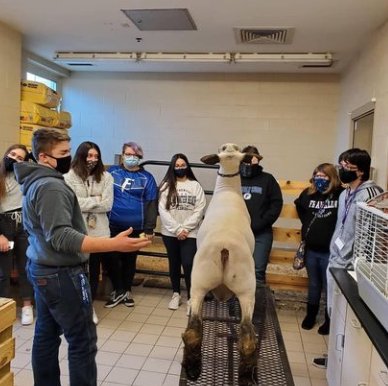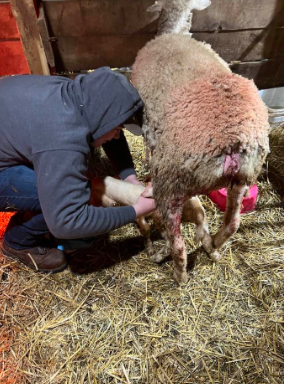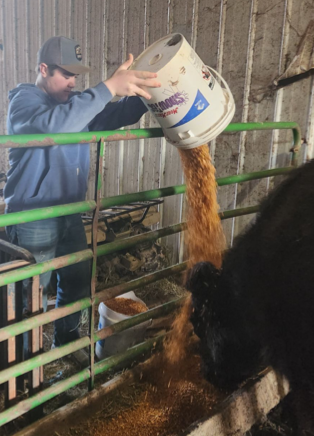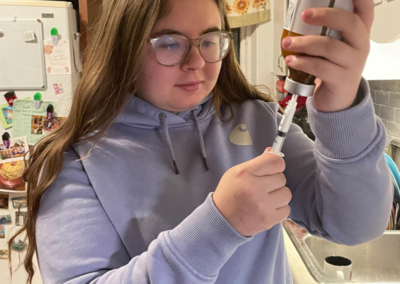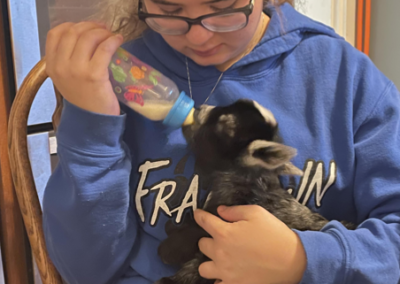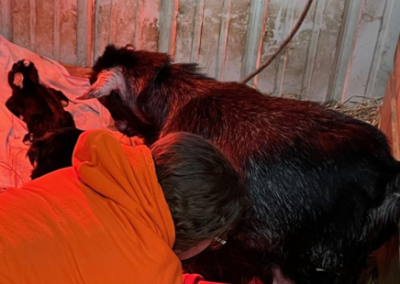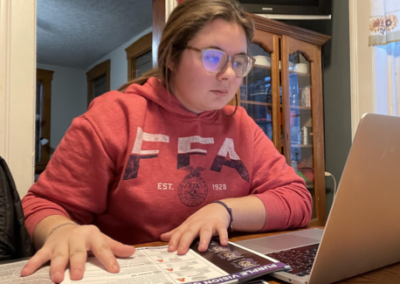SAE: Supervised Agricultural Experience
The purpose of SAE projects is to help students explore prospective careers and develop related skill sets. SAE projects may stem from interests, hobbies, current employment, ag courses or family needs. If nothing else, the SAE program should help a student narrow down career choices related to agriculture and assist students in achieving career goals. Additionally, SAE projects may develop into a lifelong activity, such as raising show cattle or gardening, which might complement another full-time career.
One of the most popular SAE projects at Franklin is showing livestock at the Johnson County Fair and Indiana State Fair. Franklin ACE program has purchased 7 dairy steers. Advisors, Alicia Geesey and Dan Batta, have assisted with livestock procurement, preparation, raising, housing and showing. To learn more about these opportunities, talk to our advisors.
Students may develop and maintain projects in any of the following categories:
- Placement (working for someone else)
- Entrepreneurship (starting your own business)
- Agriscience (experimenting and/or inventing with technologies and agriscience)
- Improvement (tractor restoration, building repair, landscaping, building a hayrack, etc)
- Internship (short; tracking and observing a professional in their day-to-day activities)
SAE projects fall into over 40 different areas related to agriculture and many areas are divided into placement and entrepreneurship categories – there are a LOT of opportunities within our own school district for unique, exciting and rewarding SAE projects.
Ag Communications
Ag Education
Ag Mechanics
Repair and Maintenance
Energy Systems
Design and Fabrication
Ag Processing
Ag Sales
Ag Services
Beef Production
Dairy Production
Diversified Ag
Diversified Crops
Diversified Horticulture
Diversified Livestock
Emerging Ag Technology
Equine Science
Fiber and Oil Crop Production
Floriculture
Food Science & Technology
Forage Production
Forest Management & Products
Fruit Production
Grain Production
Home/Community Development
Landscape Management
Nursery Operations
Outdoor Recreation
Organic Agriculture
Poultry Production
Sheep Production
Small Animal Production & Care
Specialty Animal Production
Specialty Crop Production
Swine Production
Turf grass Management
Vegetable Production
Veterinary Medicine
Chapter SAE Highlights
Samantha’s SAE
Samantha’s Supervised Agricultural Experience involved working on a U-Pick Flower farm. This farm grows 87 different varieties of flowers, with a large focus on lavender. Much of her time on the farm was spent caring for the flowers and the lavender. However, another aspect of Samantha’s job included working in the on-farm shop where they incorporate the flowers grown on the farm into a variety of different products. These products include items such as lotions, soaps, bath bombs, roll-on essential oils, dried flower bundles, and fresh flower arrangements. Learning how to create a beautiful fresh flower bouquet was a large part of Samantha’s Supervised Agricultural Experience this year. Each day, she works with the customers to help them create a beautiful bouquet with the flowers of their choice. Occasionally, her job would include working inside the shop at the register helping customers as they were checking out. During the fall, she pulls the annuals and preps perennials for the winter. She harvests these flowers so that the farm has seeds to plant for the next season. In the fall she also spends time cutting flowers, lavender, and lambs ear to dry out to sell during the following season.
Norman’s SAE
Norman’s Supervised Agricultural Experience involves breeding, raising, showing, and caring for show cattle and show lambs. He currently raises Shorthorn and Simmental cattle and Dorset, Dorset Advantages, and Hampshire sheep. His project involves caring for his animals on a daily basis, managing the breeding schedule, lambing and calving in the spring, and then preparing and fitting my animals for show through the summer and fall. In 2022, he lambed out approximately 20 ewes and calved out 6 cows. The major goal for his project is to raise animals that are more competitive in the show world. In order to accomplish this goal he has focused much of his energy and efforts on improving his own herd’s genetics as he believes that is where improvements in the show ring starts. He really enjoys continuing to learn what professional livestock judges are looking for in both the cattle and sheep show rings. He then applies that knowledge to his own herd genetics. He tries to find sires that complement his dams in order to produce higher-quality stock in every generation. Another large aspect of his project is developing his skills in clipping, fitting, daily care of his animal’s hair, and prepping them for show through the spring, summer, and fall. He has worked closely with professional fitters and judges to continue working on these skills. He has really enjoyed the development of this project and look forward to applying these skills to his future career of owning and or running a livestock operation.
Maria’s SAE
Maria’s Supervised Agricultural Experience is an entrepreneurship, in which she cares for, breeds, raises, and shows pygmy goats. When she started her herd she had very little idea of what she was looking for in a pygmy goat. She stumbled upon a family near her that had pygmy goats and she bought two does from them to show at the 4H fair. They weren’t a bad start but they certainly weren’t very high quality. She decided then that she would like to work on improving the quality of her herd. During the second year of her project, she purchased a buck and began developing her breeding program, with a focus on producing high-quality show animals. When her project first began, most of the animals that she sold were for culling purposes, however, now she is working towards producing high-quality animals for the purpose of selling for profit. Through the improvement of the genetics of her herd, she is now also able to offer breeding services to her registered bucks. The daily tasks she performs on her farm include feeding, watering, and doing wellness checks on her goats. In October, her breeding season starts; she does this in order to have her does kid in March, for managerial purposes. Between April and October is her show season, where she travels throughout the Midwest to compete at registered Pygmy goat shows. Her project is very focused on the show genetics of pygmy goats and working towards continuously improving the quality of her goats.
